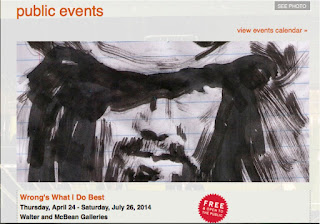 |
| Beth Orton 18" x 24.5", watercolor on poster, 2015 |
We have now the post-postmodernist era, post-internet art, metamodernism, zombie formalism, hypermodernism, and post-capitalism. From looking at it you can't distinguish post-internet art from post-internet non art, happily exploited by the commercialization of the internet. The characteristic of metamodernism is that it has characteristics of both modernism and postmodernism, floating between idealism and realism, between “a modern enthusiasm and a
postmodern irony, between hope and melancholy, between naïveté and
knowingness, empathy and apathy, unity and plurality, totality and
fragmentation, purity and ambiguity.” [Vermeulen, van den Akker, 2010] Our culture in simply confusing, we have learned that truth subjective and illusive, and that falsehood is true. We have learned that identity is flexible, we can't distinguish between human nature and the human condition, we don't know what is knowledge and what is experience. It's all a big blur. There's an overload of information and images. There's too much (art). How to navigate? Rather than to cry about it we should embrace this condition of confusion. Doesn't the lack of any certainty create a sense of freedom? We know too that this era of post-postmodernism will end, perhaps there will be a future philosopher who, like Confucius, will make sense of this mess, and provide spiritual stability. Until then: let's enjoy this period of confusionism.
The watercolor of Beth Orton was painted on a poster with a reproduction of a work by Ikki Matsumoto featuring three spoonbills. The portrait was painted in the ground (negative space) that is the bodies of the spoonbills, which is at the same time the figure (positive space). The top 100 song: Safe in Your Arms from Comfort of Strangers.

























